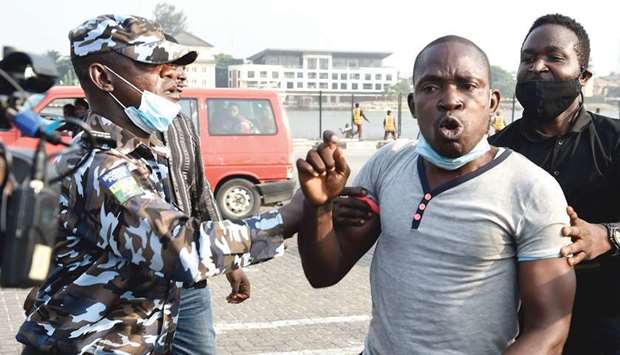Nigerian police arrested small groups of protesters in Lagos yesterday after they tried to hold a rally demanding justice for victims of a deadly shooting during demonstrations last year.
Activists had called for new protests yesterday after a judicial panel authorised the reopening of the city’s giant Lekki tollgate, where security forces shot at protesters in October.
Last year’s mostly youth-led #EndSARS protests against police brutality and bad governance brought Africa’s largest city to a standstill in October in a campaign that won backing from many high-profile celebrities.
Police yesterday bundled about 20 protesters, some chanting “What do we want? Justice”, into black vans at the tollgate where security forces had deployed since Friday evening, an AFP reporter at the scene said. “For the people that died, for the people that have been amputated. For the people that have been shot, for the victims of EndSARS, we want justice,” one young protester said before police snatched him.
“Justice is all we want, the tollgate should not be reopened.”
Small groups of protesters arrived at the tollgate area, some sitting on the ground or peacefully offering their arms to police in a sign they would be arrested.
Traffic was flowing normally, with some drivers chanting “End SARS” as they passed by.
One young protester in a red T-shirt managed to sprint away from police chasing him.
“Lekki tollgate should be made a museum of resistance and not a monument for money making,” said Damilare Adebola, 24, who spoke from the police van where he was being held.
Nigeria’s federal government and Lagos police authorities this week had warned against holding new protests at Lekki, saying the rallies could descend into violence in the name of justice.
“We are calling on all Nigerian authorities to demonstrate commitment to protect the right to peaceful protest,” watchdog Amnesty International said on Twitter.
The original #EndSARS protests, named after the SARS police force accused of abuses, spread in a major challenge to President Muhammadu Buhari’s government, even after the SARS unit was disbanded and officials promised reforms.
The demonstrations ended abruptly after the deadly shooting in Lagos and a wave of looting and unrest that followed.
Security forces say they only used blank rounds to break up groups of protesters who had defied a curfew, though Amnesty International said soldiers shot dead at least 10 people.
An investigation into last year’s violence at Lekki has stalled with representatives of the armed forces failing to appear before the panel.
After October’s deadly shooting, the United Nations, African Union, European Union and Britain urged the authorities not to use excessive force.
The wave of protests in October had been the biggest display of people power in years in Africa’s most populous nation as young people gathered to demand broader changes. The huge highway tollgate at Lekki in Lagos became the epicentre of the protest movement with musicians and celebrities joining rallies there during weeks of demonstrations.

Police officers arrest a protester during a demonstration against police brutality, at the Lekki tollgate in Lagos, yesterday.
